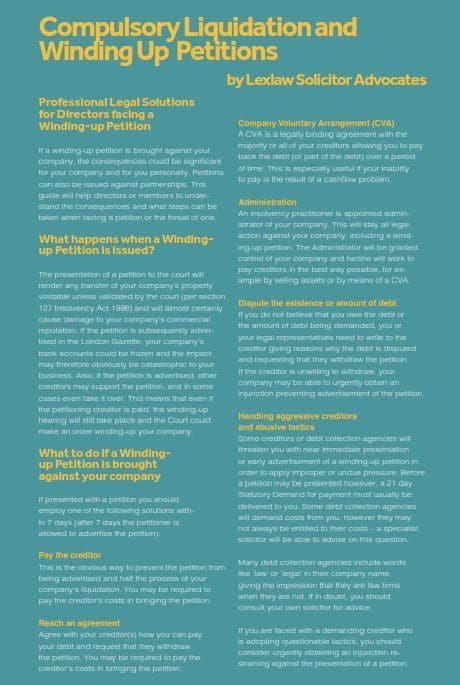The Fundamentals of Corporate Voluntary Agreement: What You Need to Know
The Fundamentals of Corporate Voluntary Agreement: What You Need to Know
Blog Article
In-Depth Analysis: The Process and Significance of Business Voluntary Contracts
Company voluntary arrangements play a critical duty in shaping the landscape of company responsibility and sustainability methods. The significance and diverse advantages of corporate volunteer agreements are obvious, yet the nuances of their implementation and the challenges dealt with in their fostering warrant closer evaluation.

Recognizing Business Voluntary Contracts
When delving right into the world of business voluntary agreements, it is important to grasp the basic concepts directing these tactical arrangements. Company volunteer contracts are formal dedications made by services to accomplish specific social, ecological, or honest objectives past lawful requirements. These arrangements are willingly participated in by business to demonstrate their devotion to accountable company techniques and sustainability.
One secret aspect to recognize about corporate volunteer contracts is that they are positive measures taken by firms to resolve societal concerns and boost their general impact. By willingly devoting to certain requirements or initiatives, organizations display their dedication to business social duty and stakeholder interaction.
Moreover, company voluntary arrangements typically involve partnership with numerous stakeholders, including federal government bodies, non-governmental organizations, and neighborhoods. This multi-stakeholder strategy guarantees that the agreements are thorough, transparent, and lined up with the passions of all involved celebrations.
Basically, understanding business volunteer agreements needs a deep recognition of their volunteer nature, the objectives they aim to attain, and the joint efforts they involve to drive favorable adjustment in the company landscape.
Negotiation Process and Methods
Reliable negotiation processes and techniques play a critical role in the successful implementation of business voluntary contracts. The arrangement procedure entails numerous parties collaborating to reach a mutually useful contract that satisfies the passions of all stakeholders entailed. To begin, it is necessary to develop clear purposes and top priorities for the arrangement. Recognizing the demands and concerns of all parties permits for the production of value-creating remedies that resolve the underlying concerns properly.
Approaches such as active listening, open interaction, and problem-solving orientation are important in cultivating a collective settlement setting. Active listening makes certain that all events really feel heard and recognized, leading to increased count on and cooperation.
In addition, keeping a professional and considerate mindset throughout the settlement procedure is key to building solid relationships and accomplishing effective end results. By employing reliable arrangement procedures and techniques, companies can browse complicated contracts much more efficiently and make certain the sustainable application of volunteer commitments.
Implementation and Conformity Actions
Having actually efficiently established a solid foundation with efficient settlement procedures and strategies, the next important phase involves the careful planning and execution of implementation and compliance steps in business voluntary agreements. Execution measures encompass the actual release of the agreed-upon terms and activities outlined in the volunteer arrangement. This phase demands careful coordination amongst all included parties to make sure that the agreed-upon efforts are implemented efficiently and efficiently.
Conformity steps play a vital function in making certain that all events entailed abide by the terms defined in the volunteer contract. Monitoring systems, periodic assessments, and transparent coverage systems are typically utilized to track development and guarantee responsibility. Non-compliance can cause reputational damages, legal ramifications, and a break down of trust among stakeholders, underscoring the significance of durable compliance procedures.
To enhance the efficiency of execution and conformity measures, clear communication, routine tracking, and quick corrective actions are vital. By prioritizing these facets, organizations can support the stability of their volunteer contracts and accomplish the wanted outcomes while cultivating depend on and liability within the business community.
Surveillance and Examination Techniques

Examination, on the other hand, entails the systematic assessment of the end results and influences of the voluntary agreements - what is a cva agreement?. By assessing the performance of the applied actions, firms can establish whether the desired goals are being attained and determine locations for renovation. Examination techniques might include studies, interviews, data analysis, and other methods to collect appropriate information for assessing performance

Impact and Benefits of Contracts
In understanding the efficiency of company voluntary agreements, it is crucial to evaluate the substantial influence and benefits that these arrangements bring to both firms and stakeholders. Corporate volunteer arrangements typically lead to boosted functional efficiencies within business.
In addition, business voluntary arrangements can cultivate better relationships between companies and stakeholders. In addition, these agreements often drive development and competition within industries, as business strive to meet and go beyond volunteer commitments, leading to favorable end results for both the organization and the bigger culture.
Verdict
In final thought, business volunteer arrangements play a critical duty in advertising sustainability and company social duty. Generally, business voluntary agreements are a useful tool for driving favorable change and advertising lasting company practices.
Business volunteer contracts play a critical function in forming the landscape of company obligation and sustainability techniques.Efficient settlement processes and approaches play a vital duty in the effective application of corporate voluntary agreements.Having actually successfully developed a solid structure through effective settlement processes and strategies, the what is a cva in business next critical phase includes the thorough planning and implementation of execution and compliance actions in corporate volunteer agreements (cva meaning business).In recognizing the effectiveness of company volunteer contracts, it is important to evaluate the substantial impact and advantages that these agreements bring to both stakeholders and firms.In final thought, corporate voluntary agreements play an essential duty in promoting sustainability and corporate social duty
Report this page